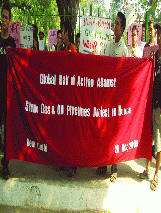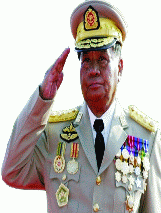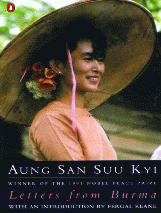Opposing China’s Shwe project in Burma
Opposing China’s Shwe project in Burma
 Voices against the foreign intrusion in Burmese economy are increasing. The pro-democracy Burmese activists and their supporters have come out with various programmes opposing a China sponsored multibillion dollar oil and gas pipeline project inside Burma (Myanmar). The dual pipelines are designed to transfer oil and gas from a Burmese state to a Southwestern Chinese province.
Voices against the foreign intrusion in Burmese economy are increasing. The pro-democracy Burmese activists and their supporters have come out with various programmes opposing a China sponsored multibillion dollar oil and gas pipeline project inside Burma (Myanmar). The dual pipelines are designed to transfer oil and gas from a Burmese state to a Southwestern Chinese province.
The initial point of the proposed oil and natural gas pipeline project will be the offshore Shwe gas fields of Arakan (or Rakhine) state. The 980 km dual oil and gas pipelines would then cross the span of Myanmar touching over 20 townships. The project will be used to pump the oil, taken by waterways from the Middle East and African countries and also natural gas from the Shwe gas fields of Myanmar to the Yunnan province of China.
The government media of China disclosed that the construction work of the pipeline project was started at Burma’s Maday Island in the Indian Ocean during November 2009. The Chinese officials, who were quoted in the news item, however did not make any comment on the completion period of the project. An unconfirmed source reveals that the oil pipeline will be ready for use within the next two years.
The most populous Communist country of the globe preferred to ignore the concerns expressed by various human rights and Burma solidarity groups. It is worth mentioning that, Beijing is heavily dependent on imported oil (almost 85%) from the Middle East and African nations to meet its huge energy needs. The country has increased its trade ties with Burma and has lately signed an agreement to become the sole buying authority of the Shwe gas reserve of Burma. Under this agreement, Beijing took the responsibility to construct a trans-Myanmar (oil and gas) corridor to feed its robust economy.
The State-owned China National Petroleum Corporation (CNPC) holds a 50.9 per cent stake in partnership with the Myanmar Oil and Gas Enterprise (MOGE) in the construction of the dual oil and gas pipelines. The project is understood to have the capacity to pump nearly 12 million tonnes of oil and 12 billion cubic metres of gas per year.
The estimated project cost is expected to be around US$2.5 billion. On the other hand, the Myanmarese government would receive $29 billion over 30 years from the deal.
“The military rulers of Myanmar, which is otherwise facing heavy economic sanctions by the United States and many European countries, keep themselves alive with the royalty earned from selling the natural resources to other countries. But all this money is hardly used for any public welfare activities,” said M. Kim, an exiled Burmese living in India.
Speaking to this writer from New Delhi, Kim (who is associated with Myanmar Centre, Delhi) also pointed out that the present group of Generals (collectively called the State Peace and Development Council) have learnt the art of ignoring the concerns of international communities about the worst human rights record and also luring the neighboring countries (China, India and Thailand) into forging trade ties with them.
Once the rice bowl of Asia, Myanmar is today one of the poorest countries on the globe, but the military junta of Nay Pie Taw (new capital of Myanmar) spends over 40 per cent of its national budget on the defense sector. Shockingly, the dictators spend only 2 per cent of the budget on health and education (of 50 million Myanmarese people).
The Southeast Asian country has been ruled by the military generals since the early sixties. The present regime is headed by Senior General Than Shwe, who has developed a kind of enmity towards the pro-democracy icon Aung San Suu Kyi. The leader of the main opposition party (National League for Democracy), Suu Kyi has been under house arrest for more than a decade now. Under pressure from international communities, the Myanmarese government had recently declared a roadmap for democracy and an election is scheduled this year. But the Than Shwe government is yet to be committed to the release of thousands of political prisoners including the Nobel laureate Suu Kyi before the polls.
The exiled Myanmarese and many other sympathetic groups had recently raised their voices against the  Chinese pipeline project inside Myanmar. Over 120 organizations based in 20 countries came out with the demand that Beijing should halt the construction of the proposed oil and gas pipeline project. Led by the Shwe Gas Movement, a Thailand based oil-gas watchdog and rights group; the movement submitted a memorandum to the Chinese government on the Global Day of Action (on October 28).
Chinese pipeline project inside Myanmar. Over 120 organizations based in 20 countries came out with the demand that Beijing should halt the construction of the proposed oil and gas pipeline project. Led by the Shwe Gas Movement, a Thailand based oil-gas watchdog and rights group; the movement submitted a memorandum to the Chinese government on the Global Day of Action (on October 28).
In the letter which was addressed to the President of the People’s Republic of China and which was sent through the Chinese Embassies in various countries like India, Malaysia, Philippines, Japan, South Korea, Australia, Sweden, Norway, Netherlands, UK etc., the campaign group not only expressed serious concern at the probable threats to the environment and common Myanmarese but also asked President Hu Jintao to stop its construction immediately.
“We are gravely concerned about the thousands of communities living along the planned 980 km pipeline corridor. Based on experiences in Myanmar, partnerships with the MOGE on infrastructure development projects invariably leads to forced displacement, forced labour and loss of livelihoods. The escalation of abuses around a project when Myanmar army soldiers provide security is well documented by UN agencies and NGOs,” stated in the letter.
The initiative was supported by a number of organizations like, All Arakan Students’ and Youths’Congress, Arakan Oil Watch, and Shwe Gas Movement (India). “What is more awful is that the local communities, who will be affected by the project, are still unaware of it and they are not being consulted. At the same time, neither the military authority nor the CNPC had initiated any environmental and social impact assessments before launching the pipeline project,” said Wong Aung, the coordinator of Shwe Gas Movement.
Speaking to this writer from Chiang Mai (Thailand), the young activist also revealed that over 10, 000 Myanmarese soldiers had already been deployed along the pipeline route. He apprehended that the number (of soldiers) would be increased in the days to come and it would simply add to the number of incidents of human rights abuses along the route of the pipelines.
“Past experiences have shown that the pipeline construction and maintenance in the country always involves forced labour, forced relocation, land confiscation, and other kinds of abuses by the soldiers engaged in the project area,” added Wong Aung. In a book titled ‘Corridor of Power: China’s Trans-Myanmar Oil and Gas Pipelines’, the Shwe Gas Movement came out with strong voices that the extraction of the Shwe natural gas deposit must be postponed until the local people in western Myanmar could participate in the decision making process about the use of the resources.
It also added that the concerned neighboring countries and also the oil companies must stop all kinds of trades with the military junta and refrain from further investment until there is a democratically elected government in the country.
It may be mentioned that a number of international corporations are engaged in the petroleum production activities in Myanmar including Daewoo International (South Korea, 51 per cent of shares in Shwe Gas Consortium), Oil and Natural Gas Corporation (ONGC Videsh, India, 17 per cent of shares in Shwe Gas Consortium), Gas Authority of India Limited (GAIL India, 8.5 per cent of shares in Shwe Gas Consortium), The China National Petroleum Corporation (purchaser of the gas and builder of the pipelines), PetroChina Company Ltd etc. In fact, Myanmar’s western coast, which is rich in oil and gas reserves, has become the battle ground for Beijing and New Delhi in recent years.
 “The western companies showed reluctance in investing in Myanmar, but both China and India continued their mission and battle over the Myanmarese oil and gas,” said an editorial of the Shwe Gas bulletin. It also added that at the time when China and India were exploiting the resources of Arakan to enhance their energy and economic security, over four million people living in the state were facing human rights abuses and economic hardship. Debbie Stothard, coordinator to Alternative ASEAN Network on Myanmar, argues that a number of projects in Burma had resulted in the displacement of thousands of poor Burmese from their own localities and they were exposed to various forms of abuse by the military.
“The western companies showed reluctance in investing in Myanmar, but both China and India continued their mission and battle over the Myanmarese oil and gas,” said an editorial of the Shwe Gas bulletin. It also added that at the time when China and India were exploiting the resources of Arakan to enhance their energy and economic security, over four million people living in the state were facing human rights abuses and economic hardship. Debbie Stothard, coordinator to Alternative ASEAN Network on Myanmar, argues that a number of projects in Burma had resulted in the displacement of thousands of poor Burmese from their own localities and they were exposed to various forms of abuse by the military.
Speaking to this writer from Bangkok, Debbie added that the Shwe pipeline project would have a heavy impact on the people living along the route and it would end up adversely affecting the entire region.
However, none of this appears to matter to the Chinese, the governments surrounding Myanmar, or any of the countries wishing to buy Myanmar’s rich natural resources.
Nava Thakuria


